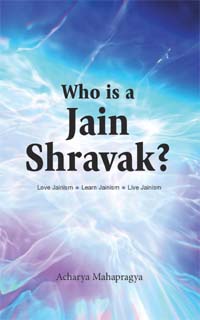Why to be a Shravakas an Observer of Vows
We have already discussed extensively on who is a shravak? The question is why one should become a shravak. Normally, it appears that observing vows is a difficult task, however, on the contrary those who do not observe vows face more difficulties. In fact, wanton people are more unsafe, aggressive, cruel, and stressful. Today, the increasing flamboyant display of wealth has raised the problem of terrorism, extremism, and kidnapping. Criminals think, 'What is the need to earn money? Just kidnap someone and enjoy the ransom which will be sufficient for the next several generations?'
Here comes the importance of being a shravak. A shravak takes the vow of not committing unnecessary violence. He discriminates between what to do and what not to do limit his consumption and practices self-restraint. He thinks, 'I cannot abstain from violence completely, but I can limit it. I will not have the possession or assets more than predefined amount or need.' So, limit in earning and consumption can bridge the social disparity and reduce crimes.
Everyone should ponder over their life style. Adopting the life style of a shravak is the need of our present era. Those who are interested in religion, visit monks and nuns, and listen to sermons are mere followers. They have faith in religion but do not follow any vows or keep any limitations. Being just a follower or listener is not enough for being a shravak.
One should think of taking up vows, limitations or restraints in one's life. Life without limits is not acceptable or praiseworthy. You live in a house. Inevitably, you are limiting your space of living. Thus, limitation is the order of life. Without limiting or disciplining your life, you can't do anything.
Once, the principal of Udaipur University, an intellectual personality, came to me and said, 'You are confined to the sect. It is a boundary or a limitation. You should remain unbounded. You are for all. You should not confine yourself
I asked him, 'You have come here. How did you come here?' Principal: 'I came by car.'
I said, 'You have confined yourself to come here. You should have come here without confining yourself
Principal: 'If I had not limited myself I would have never reached here.'
I said, 'For transportation whether you come by car or an airplane you have to limit yourself.'
There is a utility of limitation. If you are sitting in a car, train or an airplane, you restrain yourself and it leads you to your destination. If you go unbounded, you lose motion, and lose life. To be in limit, is essential. Those who only talk about unlimited are playing hide and seek game with the truth. Space may be unlimited, but life of a man is not. Therefore, one should understand the importance of limitation and accept vows wholeheartedly.
In vikram samvat 1999 (1942 AD), AcharyaTulsi was staying in Churu for his chaaturmas and composed a touching and inspiring song, 'shravakvratdhaaro'. When he sang it before the huge assembly many people accepted the twelve vows and became shravak.
Healthy Tradition of Accepting Twelve Vows
There has been a healthy tradition to be a practitioner of the twelve vows. It makes one's life pure. One, who practices these vows, leads a peaceful life and does not make life of others risky. At present, people are not evaluating the importance of vows.
With a diamond in his hand, a trader went to a gardener and asked, 'This is a shining stone. Tell me its price.' Gardener replied, 'Two radishes.' The trader then went to a potter and asked the same thing. The potter said, 'Two pitchers.' A clothes dealer said, 'Two bundles of cloth.' The jeweller was surprised to see it. He said, 'It is a precious diamond.'
Trader: 'What does it cost?'
Jeweller: 'Do you want to sell it?'
Trader: 'No. I only want to know the price.'
Jeweller: 'It costs one lakh rupees.'
The diamond whose cost was evaluated at two radishes, two pitchers, two bundles of cloth, was more than one lakh rupees.
In this context we should evaluate the vows properly. The best solution to current problems is to lead a life of vows.
AcharyaTulsi was in Mumbai. Jayaprakash Narayan, one of the eminent leaders of India, visited and stayed there for three days. The discussion led to anuvrats. Appreciating the idea of vows Jayaprakashji said, 'The concept of anuvrat is a unique and good concept. Gandhiji has also explained about eleven vows.' AcharyaTulsi said, 'BhagawanMahavira has propounded twelve vows for a shravak which lays the ground work for building a nonviolent society. It can also be known as the code of conduct of building a healthy society free from exploitation. As a matter of fact this is a panacea for the present problems prevailing in our society.'
The Definition of a Shravak
A sulabh-bodhi (a person having inclination for spiritually) and samyaktvi (a person having faith in dev, Guru and dharm) both are also called a shravak, but a real shravak is one who practices the twelve vows. This is a unique definition. AcharyaTulsi has written in Shravak Sambodha-
jo shraddhaalu shree veer-charan mein aaye,
baarah vrat dhaaran kar shravak kahalaaye,
unaka samagr jeevan hi pathdarshak hai,
vaha saptmaang ka varnan aakarshakhai.
Uvasagadasao is the seventh Aagam in Dvaadasaangi. Here, the life sketch of prominent shravaks of Bhagawan Mahavira has been described in a lucid way, which is interesting and easy to understand. The life story of these shravaks is an inspiration to the society. The life they lived can become a model for constructing a healthy society. Almost five lakh people (men and women) accepted the twelve vows by Bhagawan Mahavira. How many shravaks are observers of the twelve vows today? If the entire Jain society proceeds to adopt this tradition, it will pave the way for well-being of individuals as well as society.
 Acharya Mahaprajna
Acharya Mahaprajna
